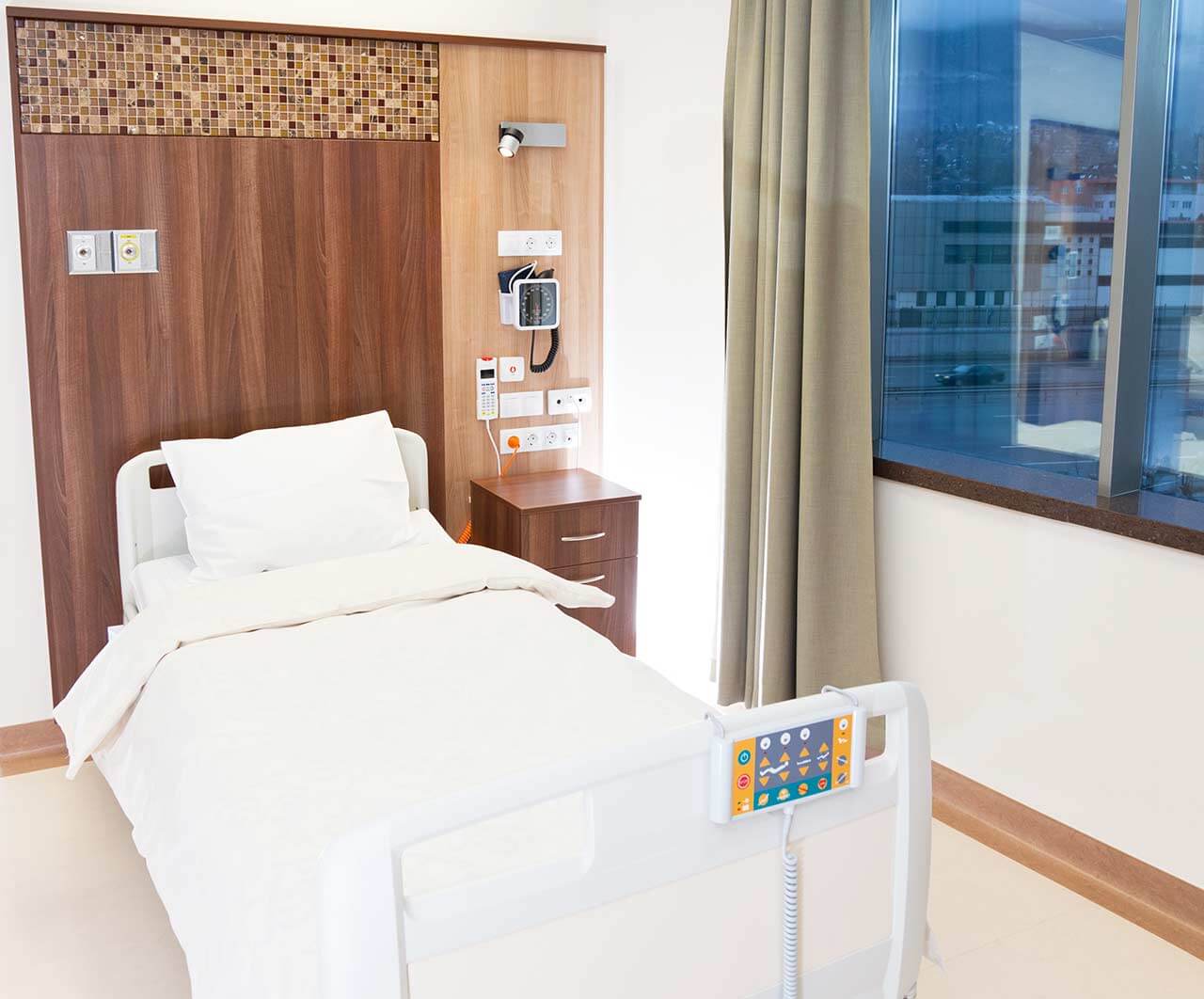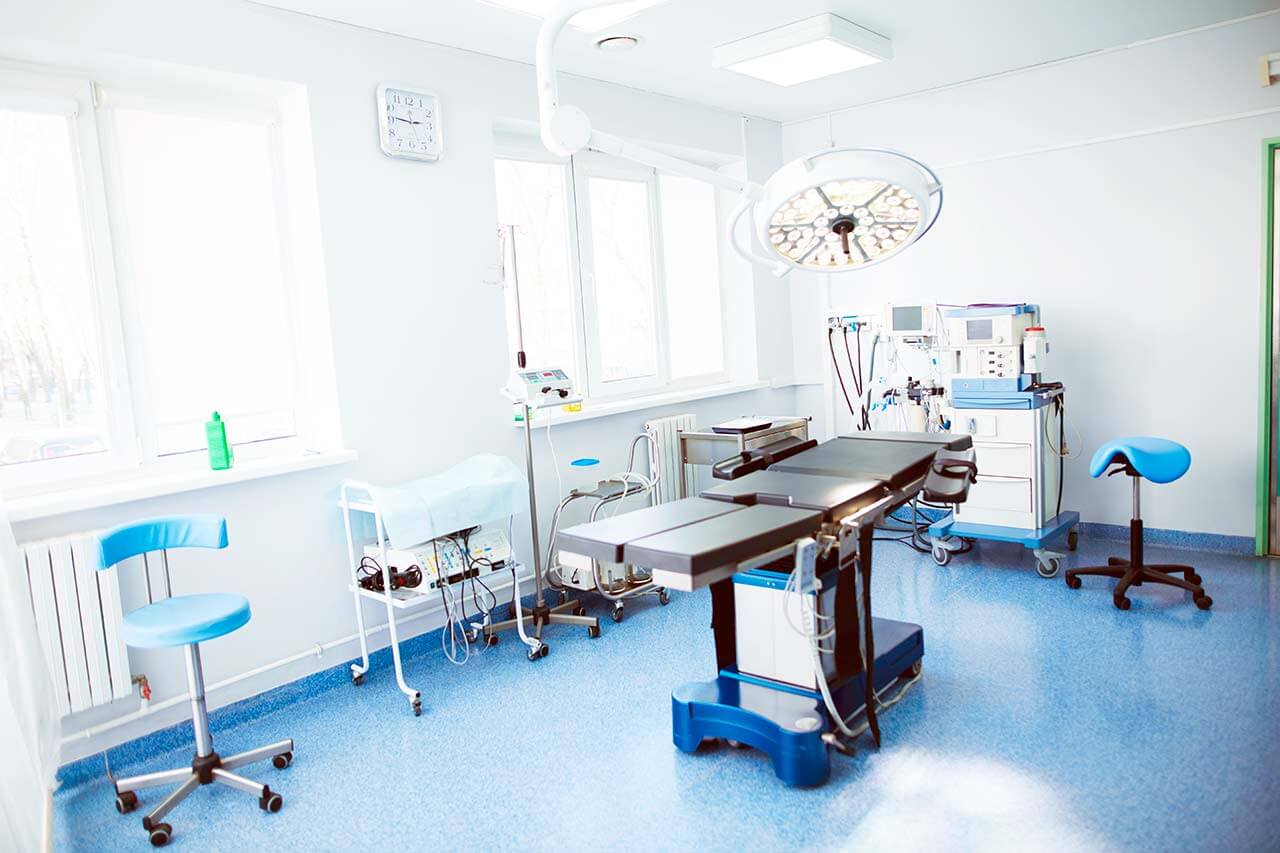
The program includes:
- Initial presentation in the clinic
- clinical history taking
- review of medical records
- physical examination
- ophthalmologic examination:
- slit-lamp examination
- pupil function tests
- ocular motility test
- ophthalmoscopy
- perimetry (visual field test)
- computer perimetry
- visometry (without correction and with correction)
- keratometry
- pachymetry
- refractometry (objective, subjective, cycloplegic)
- autorefractometry
- non-contact tonometer
- biomicroscopy
- fluorescein angiography (on indication)
- photokeratoscopy
- laser doppler retinal vessels
- electron microscopy of retinal capillaries
- laboratory tests:
- complete blood count
- biochemical analysis of blood
- blood coagulation analysis (aPTT, PT, INR)
- inflammation indicators (CRP, ESR)
- metabolic status (uric acid, total glucose, HbA1c)
- kidney function test (creatinine, urea)
- preparation according to preoperative standard
- laser retina coagulation
- symptomatic treatment
- control examinations
- nursing services
- treatment by chief physician and all leading experts
- explanation of individual treatment plan
Required documents
- Medical records
- Optical coherence tomography (if available)
Service
You may also book:
 BookingHealth Price from:
BookingHealth Price from:
About the department
The Department of Ophthalmology at the Medicana International Ankara Hospital offers the full range of services in the diagnostics and treatment of eye diseases and vision problems. Of particular interest is the treatment of cataracts, retinal, vitreous and corneal diseases. The state-of-art diagnostic equipment allows the doctors of the department to make the diagnostics as accurate as possible and to prescribe the appropriate effective treatment, taking into account individual indications and wishes of the patient. The department is headed by Dr. med. Ataman Gençgönül, an experienced ophthalmologist, who is fluent in all classical and modern ophthalmic treatment.
The main clinical focuses of the department include:
- Cataract surgery (cataract phacoemulsification). This procedure is a microsurgical method of cataract removal. During the intervention, a clouded lens or a previously implanted opaque artificial lens is removed and replaced with a transparent intraocular lens. The whole procedure takes less than one hour. An artificial lens (intraocular lens) is placed in the capsule, where the lens was removed, and remains in the patient's eye on a regular basis. The operation is performed on an outpatient basis under local anesthesia. Once the surgery is completed, the eye will be closed with a bandage or protective goggles.
- Corneal transplantation (keratoplasty). This operation is used for the surgical removal of the cornea, which does not perform its function, followed by the transplantation of the healthy cornea from a deceased donor. Corneal transplantation is usually performed under local anesthesia. Depending on the clinical indications, the patient may undergo total (penetrating keratoplasty) or partial (lamellar keratoplasty) corneal transplantation. In the case of total transplantation, the central part of the cornea dome is removed after the doctor makes the appropriate measurements. The donor cornea is placed in this hole and stitched to the remaining tissue. In partial transplantation, the outer or inner part of the recipient cornea is divided into thin layers and replaced with a donor transplant. After the removal of the patient’s own cornea and the implantation of donor one, the doctor will apply an eye bandage or prescribe protective glasses. This treatment method is the optimal option in corneal edema, keratoconus, Fuch's dystrophy, eye injuries, corneal thinning, corneal ulcer and other pathologies.
- Vitrectomy. This is one of surgical treatment options, which is used for retinal diseases, for example, in large retinal tears and detachments. The vitrectomy involves small incisions on the eye and removal of the liquid part of the vitreous body, located in the posterior part of the eye. After the treatment, air or silicone is injected into the cavity, which the liquid part of the vitreous body fills. The operation is performed under local or general anesthesia. It is successfully used in the treatment of hemorrhages, intraocular foreign bodies, infections, macular perforation and retinal tears, as well as retinal detachment.
- Retinal laser surgery (retinal laser coagulation). Such procedure is an effective treatment method for the retinal diseases, in which the surgical intervention is not an absolute indication. Laser intervention is performed on an outpatient basis. When local anesthesia of the skin around the eyes is done, the doctor uses eye drops to enlarge pupils. The procedure is carried out on an observing chair, similar to an armchair for ordinary eye examinations. During the entire procedure, the patient is conscious, but he does not feel pain. A special lens is placed on the cornea, which aims to focus the laser beams on the affected retinal area. Then the controlled coagulation of the affected retinal vessels is performed. The intervention yields positive results in such diseases as the retinal hemorrhage or leakage between retinal layers, retinal edema, detachment, macular degeneration, perforation or retinal tear, etc.
- Other treatment methods for eye diseases
Curriculum vitae
Education
- 1987 - 1993 School of Medicine, Ankara University.
- 1997 - 2000 Ophthalmology Residency Program, Gülhane Military Medical Academy.
- PhD, Beykent University Hospital, Health Institution Management.
Professional Career
- Internship Training, John Hopkins Üniversity, Wilmer Institute, Pediatric Ophthalmology.
- 2002 - 2008 Head of the Department of Ophthalmology, Istanbul Kasımpaşa Deniz Hospital.
- 2008 - 2014 Head of the Department of Ophthalmology, Ankara Mevki Military Hospital.
- 2017 - 2018 Ophthalmologist, Private Koru Hospital.
- Since 2018 Head of the Department of Ophthalmology at the Medicana International Ankara Hospital.
Photo of the doctor: (c) Medicana Health Group
About hospital
The Medicana International Ankara Hospital is one of the leading medical centers, which belongs to the largest medical network Medicana in Turkey. The hospital incorporates all specialties of the modern medicine under one roof. It particularly focuses on bone marrow transplantation, cardiology, cardiovascular surgery, medical oncology, radiation oncology, CyberKnife treatment, nuclear medicine, kidney transplantation, liver transplantation and IVF services.
With a large total indoor space (about 20,000 sq. km), 215 beds, modern architecture, high-end technology and modern quality management system, the hospital treats both Turkish citizens and many international patients. Every year, more and more patients from Europe, Russia, Northern Africa and Middle East come to Ankara to receive modern medical treatment, which meets the strictest quality standards.
A particular clinical focus is cancer treatment. The hospital has at its disposal state-of-the-art medical technologies, including, multislice CT, PET-CT, MRI ultrasound, LINAC linear accelerators capable of making IMRT, conventional and interventional radiology, nuclear medicine imaging methods and radiation oncology, which allow the physicians of the hospital to provide comprehensive diagnostics and treatment of all oncological diseases.
The hospital has brought together the best medical academic staff in the field of kidney, liver and bone marrow transplantation, etc. All employees of the hospital are constantly looking for new, clinically proven treatments in order to ensure that each patient will receive the best and most appropriate treatment in Ankara.
Photo: (c) depositphotos
Accommodation in hospital
Patients rooms
The patients of the Medicana International Ankara Hospital live in comfortable modern rooms designed in bright colors. A standard room includes an automatically adjustable bed, a bedside table, a wardrobe, a shower, a toilet, and a TV set. There is internet access in the patient rooms. The hospital also provides VIP patient rooms.
Meals and Menus
The patients of the hospital are offered a tasty, balanced three meals a day: breakfast, lunch and dinner. With appropriate indications, there may be provided a dietary or individual menu.
Further details
Standard rooms include:





